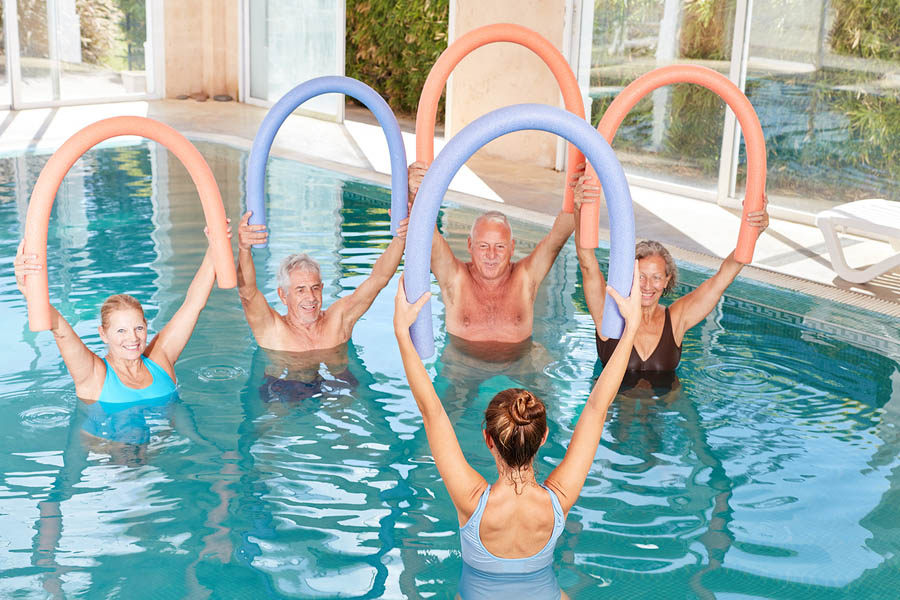Exercising improves the physical and mental health of everyone, but it has a particular impact as we age. Seniors experience several benefits such as heart health, improved muscle strength, and greater flexibility. Swimming is one of the best forms of exercise for seniors. Swimming can also improve mood and mental sharpness, as well as reduce the risk of injury.
Water exercises allow the body’s muscles to be worked without additional stress on the body. This makes it an ideal exercise for seniors as well as much younger people, making it also an excellent sport for all the generations of a family to enjoy together. The pool is an equal-opportunity playground allowing all types of people to do their thing, so all generations and physical capabilities can play together.
Physical Benefits from Swimming
Swimming is a low-impact workout experience. The lower risk for injury can allow people to exercise even if they have a few mobility issues. When in the water, all the muscle groups of the body are exercised. This allows the body to get a complete workout in a low-impact environment, and with no risk of falling, which means taking off the life alert system for a while and getting into safe territory.
Regular swimming makes the heart stronger and larger, and improves overall cardiovascular health, as well as increasing endurance. This means all lowers the risk of lung and heart disease. Regular swimming improves circulation throughout the body and lowers blood pressure.
Swimming lowers the chance of osteoporosis by increasing bone mineral density (BMD). One in three women over 50 years old are likely to experience osteoporosis, but men are only somewhat better off at one in five. Preventing these bone fractures will of course help with mobility as seniors age.
Muscle strength and tone are naturally improved as swimming works all the muscle groups in the body. As swimming through the water is resistance training, it helps to build long, lean muscles and muscle tone. This requires regular swimming sessions and workouts.
Flexibility develops through swimming, as aquatic workouts target the hips, legs, neck and arms. This works much in the same way as stretching before and after an exercise session. This regular stretching also reduces back pain and enhances posture.
Swimming is easy on the joints. For those seniors who experience joint pain and discomfort, swimming is the perfect exercise option. Being in the water is not weight-bearing so a senior builds strength and stamina without stressing uncomfortable joints like the knees, hips and back. Studies have shown that hip fractures in the elderly can be reduced by two-thirds with moderate exercise, such as swimming.
One of the biggest benefits of swimming regularly is that it can keep you feeling and looking younger for longer, from the low-impact exercise of all the muscle groups, strengthening muscles and building lung function. Researchers at Indiana University Center for the Science of Swimming studied the effects of regular swimming for individuals over 35 years of age who swam 3,500-4,500 yards, several times a week. They found that this form of regular exercise delayed the effects of aging, and that even those who didn’t swim that far still felt younger.
Mental and Social Benefits
There are mental health benefits from swimming, such as reducing stress and elevating mood levels. It has also been shown to increase brain function. Also, because people are generally swimming with other people, the opportunity is always present to develop new friendships. This social interaction can alleviate any feelings of isolation and lack of purpose.
Swimming is also a great family activity when all the generations can swim. Grandparents and grandchildren can develop deeper relationships when the seniors can swim as well as the young’uns who may have been water babies since age one – or vice versa with kids who may not have learned yet. Grandparents minding the grandkids can turn this into a great outing at the local pool, increasing family bonds in a priceless way.
A healthy lifestyle filled with activities such as regular swimming can reduce the incidence of dementia. Dementia is a big problem that currently affects five million American seniors. While age increases risk, as the syndrome develops there are associated symptoms such as a decline in mental abilities and memory. It can affect language, understanding, judgment, and thinking speed.
Regular swimming can help delay or prevent this syndrome, purely from the physical workout. When combined with the social interactions that require an awake mind, , the benefits increase. The social aspects become increasingly important in a time of increased social remoteness, and with the majority of aging Americans electing to age in place rather than live in community.
Water Exercises
Everybody can enjoy exercise in the water. There are four basic types of exercise: aerobics, resistance, relaxation, and simply swimming. As with most exercises, consult with your physician before starting to work out.
Many local gyms and community centers offer water aerobics, and several are designed for seniors. The exercises include water walking, and even dancing. Water resistance exercises can also be incorporated into an exercise plan. This includes doing leg swings, arm curls and calf raises in the water. The water provides some resistance that is lower impact than using weights and strength training equipment.
Many classes include relaxation exercises in the water. These can help lower the heart rate and blood pressure, and lower stress levels. Some centers and gyms offer aqua yoga and Pilates classes for seniors that offer relaxation techniques and toning.
Simply swimming regularly is included as a water exercises because it naturally works as one. Seniors after a little practice are usually swimming for periods of thirty minutes at one time. From the physical to the mental to the social and cross-generational, the many benefits should motivate seniors to explore swimming classes as a way to maintain their healthy lifestyles.







